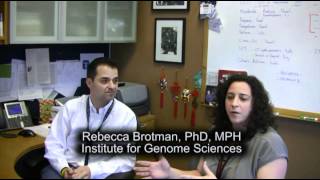- Resources
- More about HMP
Microbiome Science - Introduction
Human survival depends on the trillions of microbes that that inhabit our bodies. In a healthy person, those bacteria, fungi and viruses - the human microbiota - are well balanced. But shifts in the makeup and function of those populations can lead to diseases.
New approaches in metagenomics - which examines the genomic makeup of an entire organism, including its microbial communities - are now making such research possible.
Despite their critical role in human health, the vast microbial populations within humans are largely unexplored. IGS scientists are important players in an international effort - the Human Microbiome Project - to fill that knowledge gap.
We are not alone! Trillions of microbes (collectively known as the human microbiota) reside on and in the human body. Our bodies contain 10 times more microbial cells than human cells; the adult human colon alone contains up to 100 trillion bacteria.
Deepening the understanding of those microbial communities in places like the human gut will help scientists nail down their exact roles in health and disease. Such microbes encode metabolic pathways that are not present in human genomes, but that are essential for our survival.
Shifts in the makeup and function of these microbial populations can be associated with a number of acute and chronic diseases. These include inflammatory bowel disease, obesity, cardiovascular disease, eczema and other skin diseases, vaginal conditions and even certain types of cancer.
Most of these microbes are not the types that cause illness or infections. Rather, our bodies have evolved to work in concert with these organisms to help us digest many of the foods that we eat, break down toxic compounds we ingest on a daily basis and play an important role in keeping pathogenic organisms in check.
As IGS and other scientists reconsider a number of familiar diseases in the context of microbial ecology, exciting prospects emerge for designing, implementing, and monitoring strategies for intentionally manipulating the human microbiota to optimize our health.
What is Metagenomics?
Metagenomics is an examination of biology at the level of an entire organism, focusing on the genes in the community and how they interact to serve a collective function. Put simply, metagenomic combined with other 'omics approaches aims to answer three simple questions when studying microbial communities: "Who is there?" "What are they doing?" and "How are they doing it?" Using these 'omics tools, scientists have the potential to discover how our changing environment affects our microbial communities, to identify new diagnostics, to better understand the underlying molecular basis of disease, and, ultimately, to develop more personalized therapeutic treatments.
What is Metagenomics?
The Human Microbiome Project (HMP) is an international research initiative that is laying the foundation for studies of human-associated microbial communities in health and disease. The HMP applies the techniques of metagenomics to the analysis of microbial community structure and function. The HMP is starting to answer such questions as whether or not humans share a core microbiome and how our microbial communities change over time in response to aging, disease, medications, lifestyle and other interventions. In addition to projects funded under the HMP, IGS is also hosting the HMP Data Analysis and Coordination Center (DACC), and is responsible for the data collection and analysis of HMP researchers at IGS, as well as internationally.

